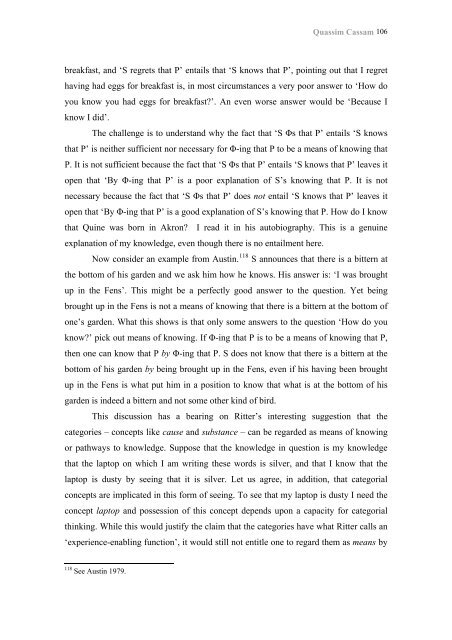Complete Issue in PDF - Abstracta
Complete Issue in PDF - Abstracta
Complete Issue in PDF - Abstracta
You also want an ePaper? Increase the reach of your titles
YUMPU automatically turns print PDFs into web optimized ePapers that Google loves.
Quassim Cassam 106<br />
breakfast, and ‘S regrets that P’ entails that ‘S knows that P’, po<strong>in</strong>t<strong>in</strong>g out that I regret<br />
hav<strong>in</strong>g had eggs for breakfast is, <strong>in</strong> most circumstances a very poor answer to ‘How do<br />
you know you had eggs for breakfast?’. An even worse answer would be ‘Because I<br />
know I did’.<br />
The challenge is to understand why the fact that ‘S Φs that P’ entails ‘S knows<br />
that P’ is neither sufficient nor necessary for Φ-<strong>in</strong>g that P to be a means of know<strong>in</strong>g that<br />
P. It is not sufficient because the fact that ‘S Φs that P’ entails ‘S knows that P’ leaves it<br />
open that ‘By Φ-<strong>in</strong>g that P’ is a poor explanation of S’s know<strong>in</strong>g that P. It is not<br />
necessary because the fact that ‘S Φs that P’ does not entail ‘S knows that P’ leaves it<br />
open that ‘By Φ-<strong>in</strong>g that P’ is a good explanation of S’s know<strong>in</strong>g that P. How do I know<br />
that Qu<strong>in</strong>e was born <strong>in</strong> Akron? I read it <strong>in</strong> his autobiography. This is a genu<strong>in</strong>e<br />
explanation of my knowledge, even though there is no entailment here.<br />
Now consider an example from Aust<strong>in</strong>. 118 S announces that there is a bittern at<br />
the bottom of his garden and we ask him how he knows. His answer is: ‘I was brought<br />
up <strong>in</strong> the Fens’. This might be a perfectly good answer to the question. Yet be<strong>in</strong>g<br />
brought up <strong>in</strong> the Fens is not a means of know<strong>in</strong>g that there is a bittern at the bottom of<br />
one’s garden. What this shows is that only some answers to the question ‘How do you<br />
know?’ pick out means of know<strong>in</strong>g. If Φ-<strong>in</strong>g that P is to be a means of know<strong>in</strong>g that P,<br />
then one can know that P by Φ-<strong>in</strong>g that P. S does not know that there is a bittern at the<br />
bottom of his garden by be<strong>in</strong>g brought up <strong>in</strong> the Fens, even if his hav<strong>in</strong>g been brought<br />
up <strong>in</strong> the Fens is what put him <strong>in</strong> a position to know that what is at the bottom of his<br />
garden is <strong>in</strong>deed a bittern and not some other k<strong>in</strong>d of bird.<br />
This discussion has a bear<strong>in</strong>g on Ritter’s <strong>in</strong>terest<strong>in</strong>g suggestion that the<br />
categories – concepts like cause and substance – can be regarded as means of know<strong>in</strong>g<br />
or pathways to knowledge. Suppose that the knowledge <strong>in</strong> question is my knowledge<br />
that the laptop on which I am writ<strong>in</strong>g these words is silver, and that I know that the<br />
laptop is dusty by see<strong>in</strong>g that it is silver. Let us agree, <strong>in</strong> addition, that categorial<br />
concepts are implicated <strong>in</strong> this form of see<strong>in</strong>g. To see that my laptop is dusty I need the<br />
concept laptop and possession of this concept depends upon a capacity for categorial<br />
th<strong>in</strong>k<strong>in</strong>g. While this would justify the claim that the categories have what Ritter calls an<br />
‘experience-enabl<strong>in</strong>g function’, it would still not entitle one to regard them as means by<br />
118 See Aust<strong>in</strong> 1979.




